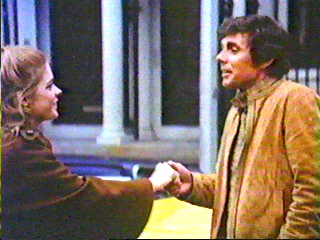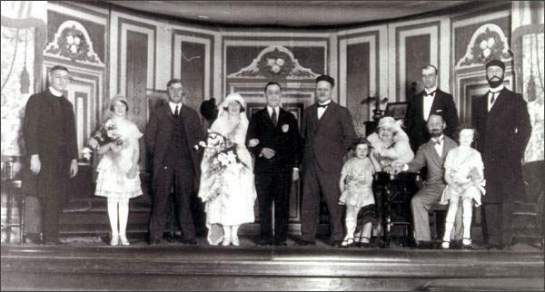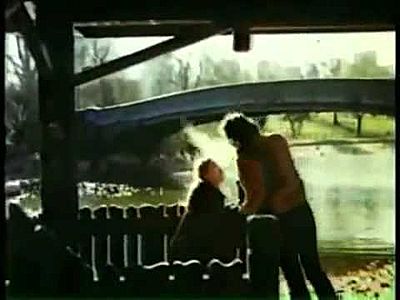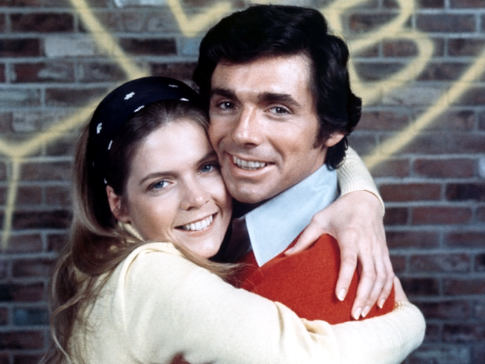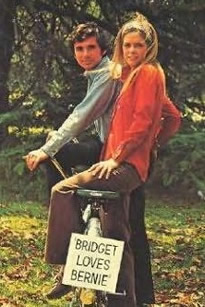A young off-duty New York cabbie spots a pretty girl on the street, trying to hire a ride. Intrigued, he decides he’s now “on duty” and stops for her. She likes the guy too, and after a few “meet cute” visuals, she exits at the school where she teaches. That afternoon, as she leaves, guess what cab (and what cabbie) is waiting for her? Before anyone can say “musical montage”, we see scenes of a young couple newly in love, kissing sweetly. Then, unfortunately, the following exchange occurs:
“You know, this is crazy. I don’t even know your full name!”
“Bernie… Steinberg. What’s yours?”
“Bridget. Bridget… Teresa… Mary… Colleen… Fitzgerald.”
“I think we have a problem….”
–the first actual lines in the pilot episode of Bridget Loves Bernie
Such is the set-up for one of the more popular romantic comedies of the early 1970’s, Bridget Loves Bernie. It was a tumultuous time in America, with the ending of the Vietnam War and the beginning of the fall of the Nixon Presidency. Public opinion was changing on lots of things, both political and societal, and in the midst of this change came a romantic comedy about two people deeply in love… and their families, who were as opposite as they could be.
“The important thing is for us not to over-react.”
–Bridget’s father to her mother, about to meet Bernie
Bridget (Meredith Baxter) was a schoolteacher from a rich Catholic home. Her parents Walter and Amy (played by TV vets David Doyle and Audra Lindley, respectively) were very traditional stock, and despite the quote above, they’re very good at over-reacting. They really only accept Bernie (and his Jewish faith) because it seems a lesser difficulty than their initial fear of Bridget bringing home an African-American (or, as Amy puts it in the vernacular of the time, “colored”). They try to put on a brave face, but make just about every possible “enlightened” mistake they could make along the way. Their efforts of acceptance make walking on eggshells look easy.
Of course, if the Fitzgeralds have eggshells, the Steinbergs make omelets. Sam and Sophie Steinberg (Harold J. Stone and Bibi Osterwald) own a deli, and are a bit awed by the wealth of the Fitzgeralds. We meet them (and their underdog attitudes) as they arrive at the Fitzgeralds, looking for a missing Bernie. Bridget is also missing, and so the opposing families are united in their worry. The only things they agree on are the safety of their children, and that their relationship should be stopped before it starts….
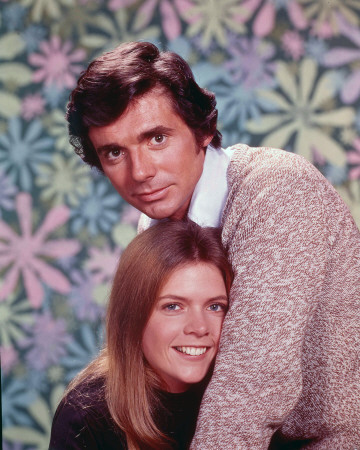 That’s kind of difficult when Bridget and Bernie have taken matters into their own hands. They were missing due to having an appointment at the courthouse, and their civil marriage ceremony. Even with no priest for the Fitzgeralds or rabbi for the Steinbergs, Bridget and Bernie are still married (a fact the parents will now have to get used to). Although it’s too late for the parents to stop the wedding, they’ll still interfere in their own ways.
That’s kind of difficult when Bridget and Bernie have taken matters into their own hands. They were missing due to having an appointment at the courthouse, and their civil marriage ceremony. Even with no priest for the Fitzgeralds or rabbi for the Steinbergs, Bridget and Bernie are still married (a fact the parents will now have to get used to). Although it’s too late for the parents to stop the wedding, they’ll still interfere in their own ways.
Bridget and Bernie do have some allies in all this. Bridget’s brother Michael (Robert Sampson) is a priest, but is likely one of the more level-headed members of this bunch (and understanding of the relationship). Bernie’s uncle Moe (Ned Glass) is a guy for whom religion is important, but practicality and people will trump it every time. And finally, we have the couple’s friend Otis (William Elliott), who shares cab-driving duties with Bernie. Otis happens to be the African-American initially mistaken for Bridget’s beau, giving a friendly perspective on the trials the young couple is going through.
Living above the deli in Bernie’s small apartment, Bridget Loves Bernie uses the marriage, and the families and friends, to examine many of the social issues of the day. Religious differences, political alignments, social classes, racial prejudices, and pretty much every other disparate point of view are on display here. The surprising part is, this wasn’t new news, even in 1972.
“Showing that the Jews and the Irish crack equally old jokes.”
–theatre critic commenting on Abie’s Irish Rose
Bridget Loves Bernie is primarily based on an old Broadway play called Abie’s Irish Rose from the 1920’s. Made twice into a movie (and forming the basis for more), the critics thought the show was rehashing old ideas and prejudices even then. The play was, however, a popular success, setting (at the time) the record for the longest running Broadway show EVER. It was also made into a radio series, running for two and a half years. Audiences loved the idea of feuding families, as the concept had likely been around even longer (say, Romeo and Juliet?)
You would think, especially after the turbulent ’60’s, America might accept such a television series. After all, the success of CBS’s previous season hit All in the Family (and its groundbreaking use of the Archie Bunker character) likely meant the audience was more than ready for such a comedy. Bridget Loves Bernie was slotted in the half-hour immediately following All in the Family, and achieved enough viewer interest to become a top 5 success on all of television for the season.
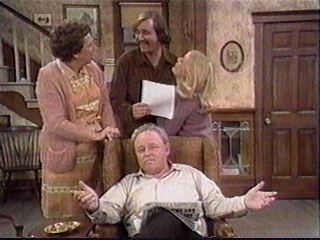 But success brings attention, and attention sometimes brings controversy. Archie Bunker was, for most people, lovably WRONG in his attitudes, demonstrably so. Most watching All in the Family agreed. But when Bridget Loves Bernie presented, in a bit more realistic way, disagreements many families were currently dealing with (prominently featuring religion as a sticking point), all of a sudden tradition, religion, and faith take on a slightly different color.
But success brings attention, and attention sometimes brings controversy. Archie Bunker was, for most people, lovably WRONG in his attitudes, demonstrably so. Most watching All in the Family agreed. But when Bridget Loves Bernie presented, in a bit more realistic way, disagreements many families were currently dealing with (prominently featuring religion as a sticking point), all of a sudden tradition, religion, and faith take on a slightly different color.
People get blind spots when discussing religion; more so than many other personal positions. It tends to define much of who we are as individuals, as family, as class. Religion, sometimes more than ethnic background, forms the basis of identity, and when we see it (supposedly) tossed away by our youth, over-reactions are common. It is no wonder that the Steinbergs and the Fitzgeralds argue, as the relationship seems to threaten their own life-identities… or, at the very least, the identities they had believed true for their own son or daughter.
But here’s the big difference, one which was true in Romeo and Juliet, in Abie’s Irish Rose, in Bridget Loves Bernie, and even today. RELIGION IS NOT FAITH. Bridget truly loves Bernie, not in spite of his being Jewish, but because he’s Bernie, and that encompasses everything about him, including the fact that he and his family are Jewish. Bernie does the same, loving Bridget (and, by extension, her family) for everything she is. Both of them do so, allowing for their parents misconceptions and misunderstandings, for the sake of each other.
Love is that strong. Faith is that strong. Religion, on the other hand, is just rules, made by others, for the practice of faith. But true belief, in each other, and in whatever supreme being you may have, is what makes faith real, concrete, and part of our lives. Religion is just the (sometimes unnecessary) trappings thereof. Bridget, Bernie, and their friends and families, learn to live beyond religion, but not beyond faith. Your faith does not, and never will, threaten mine… and mine will never threaten yours, if we can simply agree to have both love and faith.
Some people had problems with this, as tightly woven the concept of religion was in their lives. It was the same way with Abie and Rose’s parents, and the same with Bridget and Bernie’s, at least at first. But some didn’t let go of this idea, and were outraged that they were somehow being portrayed as “wrong” on television (they weren’t… that’s the blind spot). Encouraged by religious leaders, complaint letters were sent to the network (even by people who’d never sampled the show), and although the series was extremely popular, CBS got tired very quickly of all the negative publicity.
Despite all this, the show was hugely popular. As I said, during its one and only season Bridget Loves Bernie was the #5 rated show on television… and thanks to the pressure campaign, it was still canceled. These days, corporate masters would simply say all the right things and placate those who generated a disproportionate response, and keep Bridget Loves Bernie on the air. And, as much as I would love to say the show would be kept on for the right reasons, it would be kept on only for the money it would generate… which tells you about the type of “faith” television networks believe in these days. But at least the series would have continued, and positive messages of love and belief might have triumphed over blind spots and over-reaction.
Bridget Loves Bernie was that rare show that tackled topical subjects with a heart… and its heart was broken. I would like to hope that people can find a way past their differences if love is truly in their hearts… and at the very least, understand and allow for differences along the way. This is true for families, and just as true for strangers along the way. Messages are more important that individual shows. Allowing others to love, in their own way, harming no one else, is the message I will always have faith in.
Bridget: “Our poor parents. We chose each other. It’s going to be tough on them.”
Bernie: “I wouldn’t worry. We’re going to be there to help them through the rough spots.”
MEREDITH BAXTER (Bridget Teresa Mary Colleen Fitzgerald Steinberg) had success early, as she’d been in the television business less than two years when she was cast as Bridget. In 1976 she became a supporting member of the cast of Family, earning two Emmy nominations for Best Supporting Actress in a Drama. Her most popular role was as Elyse Keaton in Family Ties, which ran for seven seasons. She’s the author of Untied: A Memoir of Family, Fame, and Floundering, which discusses her life amid alcoholism, breast cancer, and her decision to openly declare her homosexuality.
DAVID BIRNEY (Bernie Steinberg) has earned Broadway credits, appearing in Amadeus and Man and Superman, in addition to numerous other stage roles in major theatres across the country. He’s starred in a number of TV series, including Serpico and St. Elsewhere. He’s best known on television for roles in various miniseries, including a star turn in the early American drama The Adams Chronicles.
DAVID DOYLE (Walter Fitzgerald) is a television veteran, guesting on numerous series. As the featured male on Charlie’s Angels, he was surrounded by beautiful women on a regular basis (yet still shone enough to earn himself an Emmy nomination). In his later years, he specialized in voice-over acting for many animated series, until his death in 1997 due to a heart attack.
AUDRA LINDLEY (Amy Fitzgerald) played many years on two soap operas, Search for Tomorrow and Another World, before making it to prime time with Bridget Loves Bernie (where she was nominated for a Golden Globe). She reached stardom in her memorable portrayal of Mrs. Roper in Three’s Company, although the spin-off featuring her character not as successful. She continued acting in recurring parts on both Friends and Cybil, until her death in 1997 at the age of 79 (supposedly with her next Cybil script on the table next to her!)
HAROLD T. STONE (Sam Steinberg) found Broadway fame as a young man, appearing on the Great White Way in 1939. A few years later, he headed west and found a film career as a steadily working actor in movies. He found his niche in the early days of television, appearing in well over 150 different shows. He was a regular on My World and Welcome to It as well as Bridget Loves Bernie, but was best known for the many tough-guy guest roles he played on ’60’s and ’70’s series. He passed in 2005 at the age of 94.
BIBI OSTERWALD (Sophie Steinberg) never achieved stardom, but in her lengthy career she did perform guest roles in series such as Route 66, All in the Family, Remington Steele, and Home Improvement. One of her favorite roles was Dolly Levi in Hello, Dolly, where she once was understudy to famed dancer Ginger Rogers. She died of lung disease in 2002.
ROBERT SAMPSON (Father Michael Fitzgerald) was a surprising choice for comedy in Bridget Loves Bernie, considering in most of his career he’s been featured in dramatic roles. He appeared on many early TV series, including the original Twilight Zone, Bonanza, and Combat! After Bridget Loves Bernie, he was seen on Police Story, Falcon Crest, Matlock, and Profiler. He was also featured in the cult horror film Re-Animator, in a significant enough role that he still makes convention appearances to this day.
NED GLASS (Uncle “Moe” Plotnick) made a career out of playing slightly disreputable small-time crooks, usually for laughs. He played opposite comedic legends like The Three Stooges, Jackie Gleason, Red Skelton, and Phil Silvers. He was nominated for an Emmy for his role in Julia, and performed with everyone from Elvis Presley and Jack Lemmon to Herbie, the Love Bug. He passed, after a lengthy illness, in 1984.
WILLIAM ELLIOTT (Otis Foster) was a recurring character on Adam-12, but other than his role on Bridget Loves Bernie, he’s best known for his roughly eight-year marriage (and later divorce) to Grammy-winning singer Dionne Warwick. Elliott died in 1983 at the age of 49.
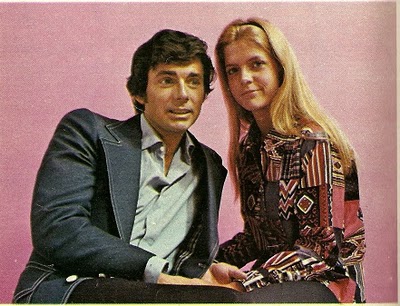 Bridget Loves Bernie has never been available on DVD. Two episodes are available on YouTube, including the pilot, where you’ll also find the appropriately titled theme song, “Love is Crazy”. Bridget Loves Bernie holds the distinction of being the highest rated full season show ever canceled by one of the big three networks (finishing at #5 for the year), and in this day of money and corporate decision-making, it’s doubtful that record will ever be broken. There has been a multitude of information written about the subsequent marriage and eventual break-up (and further reasons for it) between the show’s stars, Meredith Baxter and David Birney, but this website is NOT the place for such intensely personal discourse. Quite honestly, the themes of the show are much bigger, and so they are the focus of this article.
Bridget Loves Bernie has never been available on DVD. Two episodes are available on YouTube, including the pilot, where you’ll also find the appropriately titled theme song, “Love is Crazy”. Bridget Loves Bernie holds the distinction of being the highest rated full season show ever canceled by one of the big three networks (finishing at #5 for the year), and in this day of money and corporate decision-making, it’s doubtful that record will ever be broken. There has been a multitude of information written about the subsequent marriage and eventual break-up (and further reasons for it) between the show’s stars, Meredith Baxter and David Birney, but this website is NOT the place for such intensely personal discourse. Quite honestly, the themes of the show are much bigger, and so they are the focus of this article.
One would like to think that, in our modern, more enlightened (?) times, the types of differences examined in Bridget Loves Bernie would no longer be prominent. Mixed marriages of religion, not to mention race, are becoming much more commonplace, and for many don’t even rate a mention, let alone an argument. And yet, newer disagreements are taking place all across the land, for many of the same reasons. The fight for gender equality and the rights of civil, let alone religious, marriage for same-sex couples divides many families and households. The depiction of Catholic vs. Jew seems almost quaint for some… and yet for others it is a difference causing permanent separation between loved ones. The battles are old. Just the fighters are new.
And yet, here’s the common thing, the one thing that gives me hope all along the way. Love wins out, every time. Only those who close their hearts and cling to rules instead of humanity lose, and they do it only by their own choice. There’s a reason the show was called Bridget Loves Bernie… and it’s because, after all is said and done, it is not religion, or social class, or anything else that matters. The only thing that matters is love….
–
Vital Stats
24 aired episodes — none unaired
CBS Network
First aired episode: September 16, 1972 (the day before CBS aired the first episode of M*A*S*H)
Final aired episode: March 3, 1973 (no pre-emptions — you don’t pre-empt a hit)
Aired at Friday, 8/7 Central? Saturdays, 8:30, 7:30 Central. A year later, this Saturday night became the best night of television on television, with the five shows airing on CBS all making Time Magazine’s list of the best 100 TV shows in history. Bridget Loves Bernie, if it had survived, could easily have been there too.
Comments and suggestions appreciated, as always.
–Tim R.

